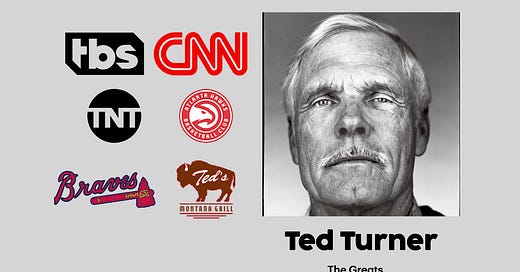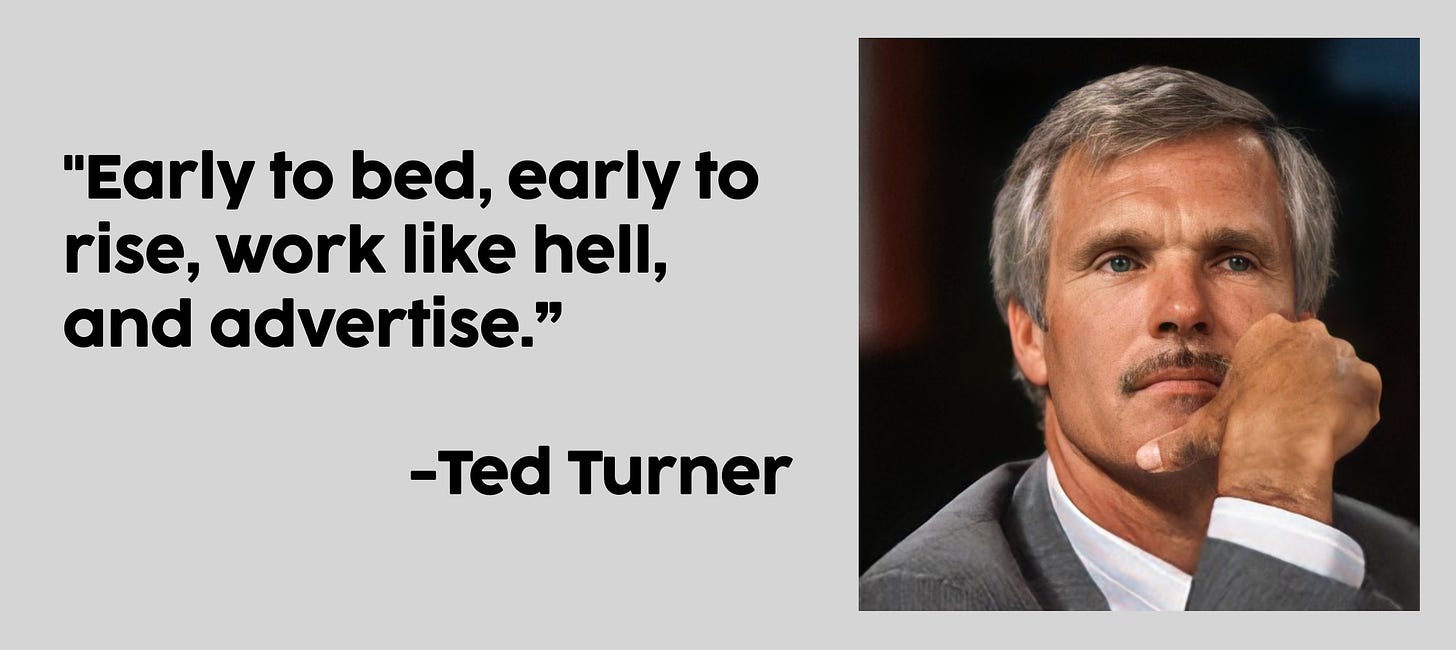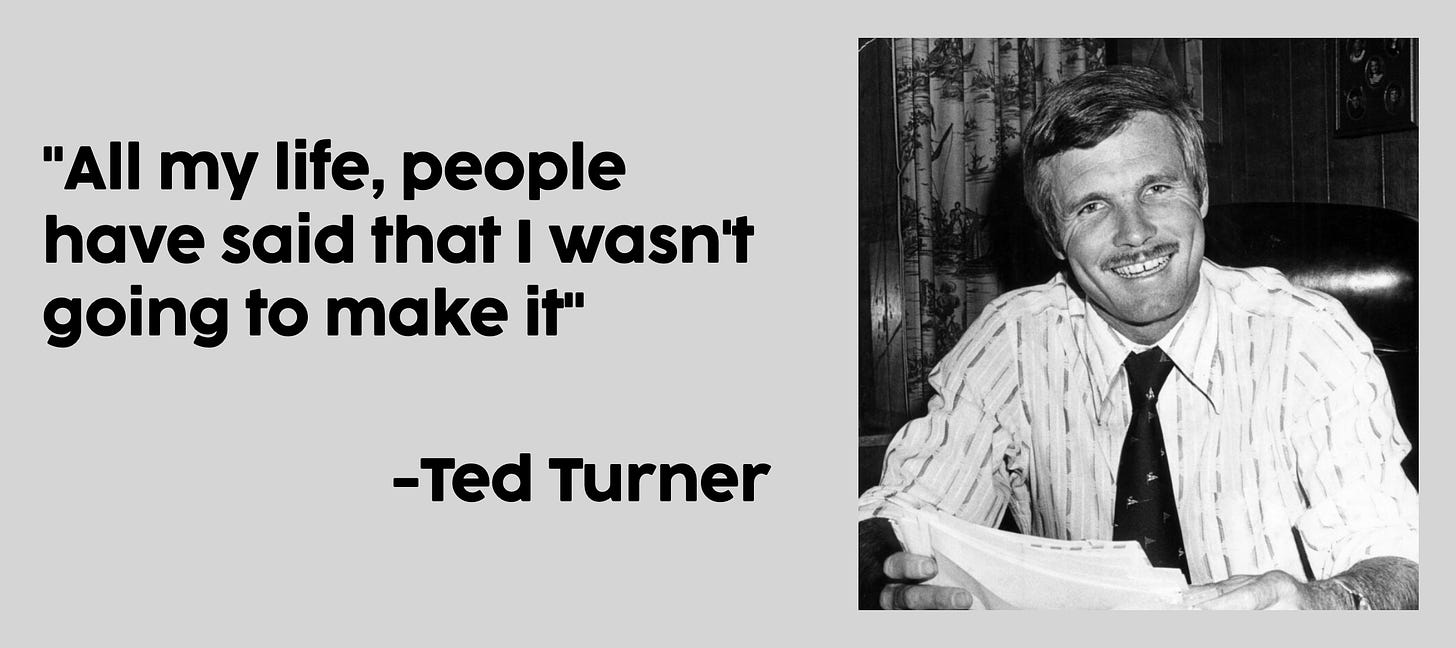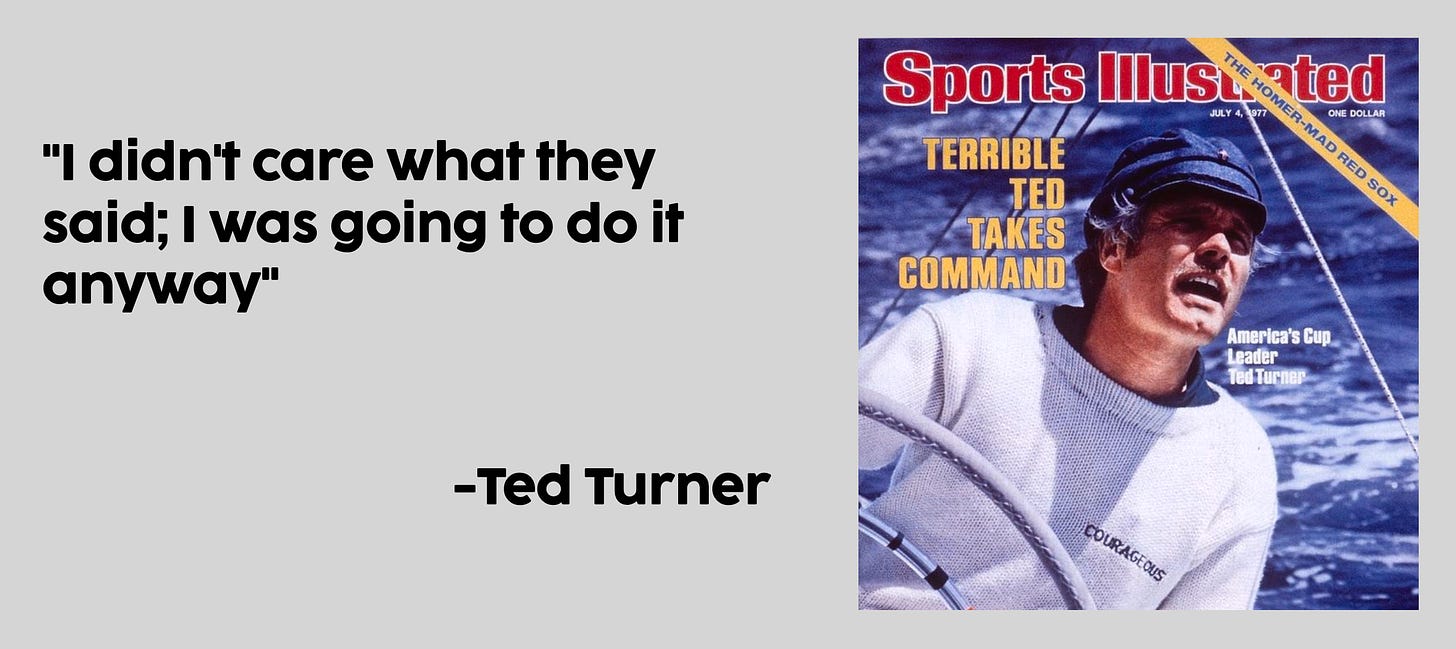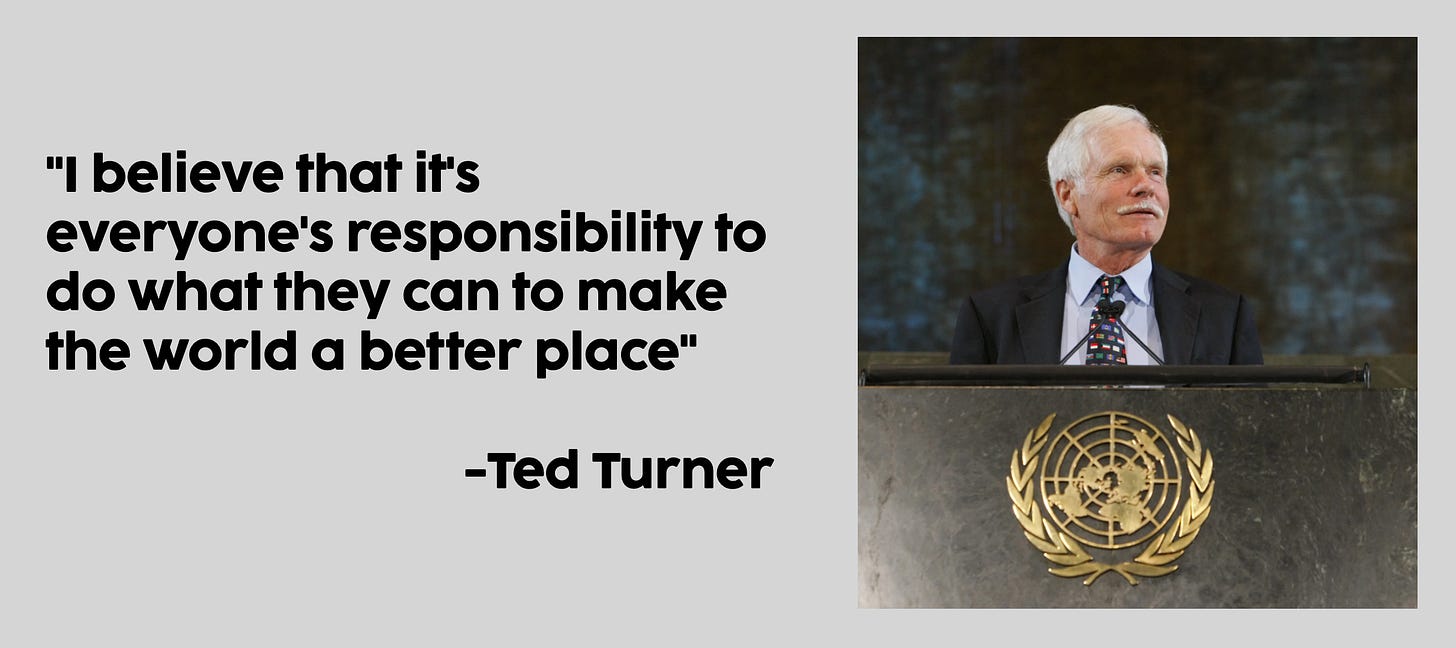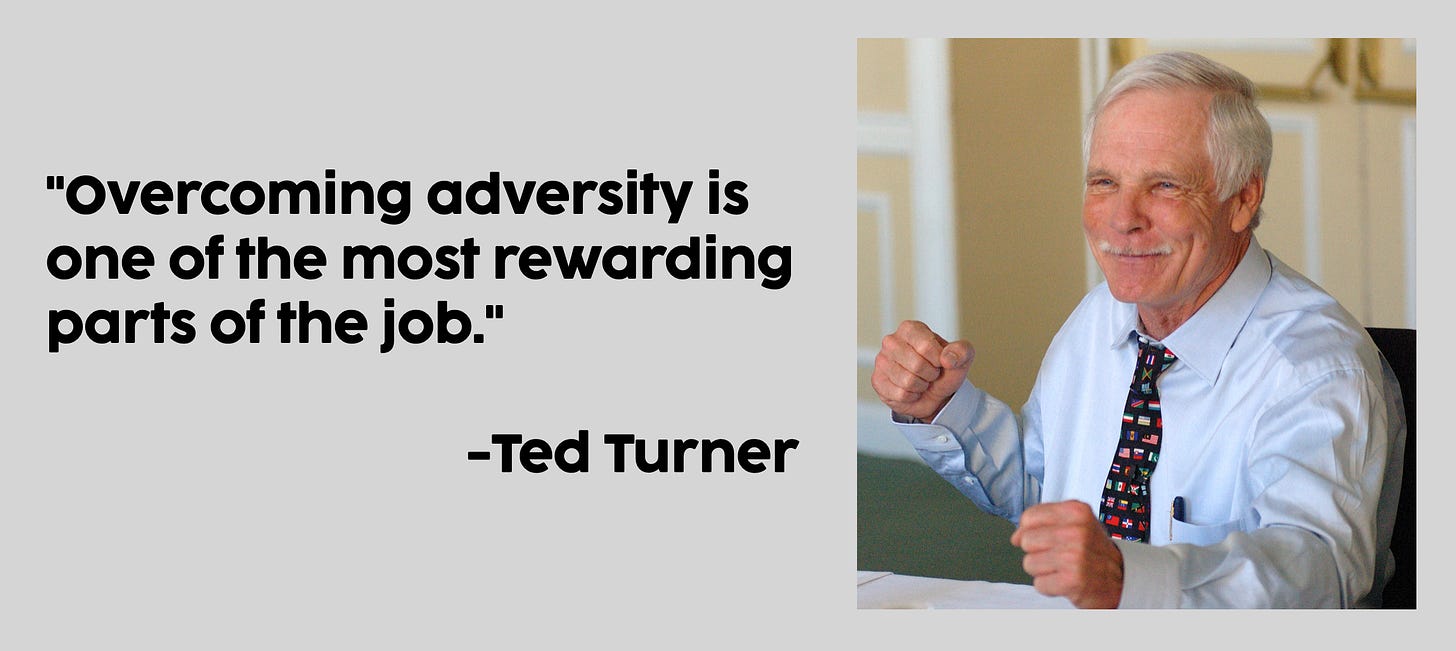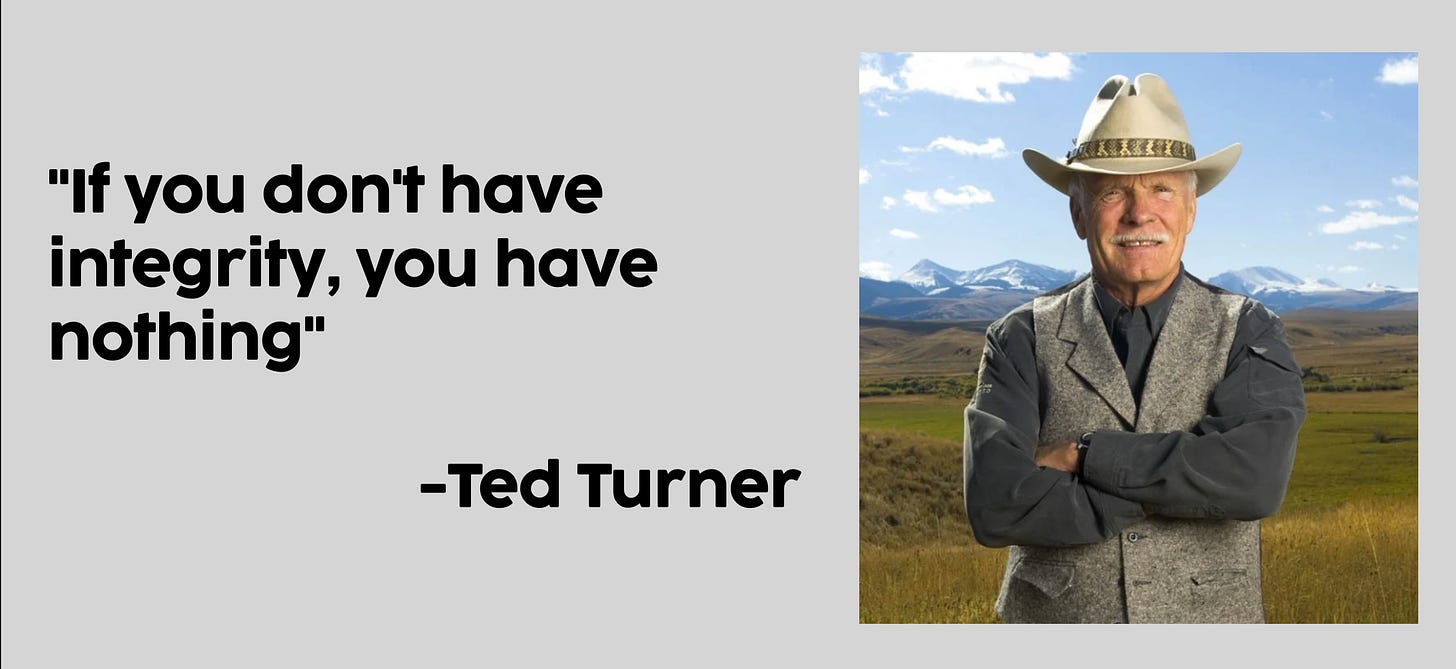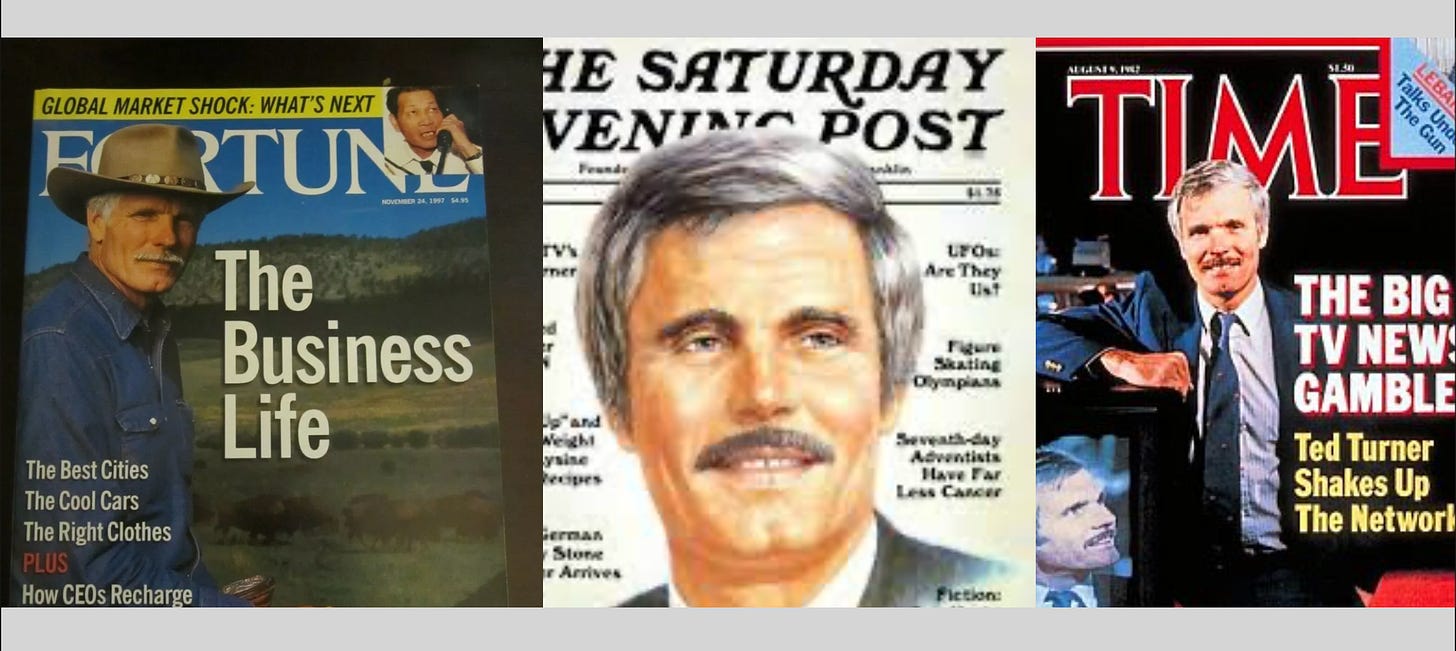👋 Hey, I’m Yon. Welcome to The Greats. I delve into the extraordinary journeys of the world’s most influential figures. The Greats aims to become a treasure trove of inspiration, knowledge, and motivation to help you achieve fulfillment and greatness in your journeys.
Ted Turner's name is synonymous with groundbreaking media innovations and a deep commitment to philanthropy and environmentalism. As the founder of CNN, the first 24-hour news network, Turner revolutionized how news is consumed worldwide. Inspired by his autobiography, Call Me Ted, this letter brings to you key takeaways from Turner's life and career as a media mogul and philanthropist.
Five actionable takeaways inspired by Ted Turner’s life:
Value Integrity: Maintain honesty and transparency in your dealings. Ethical leadership builds trust and a strong reputation.
Embrace Vision and Risk: Don’t avoid big ideas and bold moves. Innovation often requires stepping into uncharted territory and taking calculated risks.
Lead with Passion and Persistence: Be deeply involved in your work, inspire your team, and persevere through challenges.
Diversify Interests: Engage in diverse ventures to mitigate risks, foster innovation, and enrich your personal and professional life.
Commit to Philanthropy: Use your success to give back, whether through environmental conservation, supporting social causes, or community involvement.
Breaking New Ground
Ted Turner's career is a testament to the power of vision and the willingness to take risks. After inheriting his father's billboard advertising business, Turner quickly realized the potential of expanding into media. His most audacious venture was the creation of CNN in 1980, a concept many industry experts doubted. Turner envisioned a network that would provide news around the clock, a revolutionary idea at a time when news was limited to scheduled broadcasts.
Turner's decision to launch CNN was about innovation and his deep-seated belief in the power of information. He saw the potential for a global news network to democratize access to information, a vision that required him to invest heavily in satellite technology and infrastructure.
Turner once said, "Early to bed, early to rise, work like hell, and advertise," encapsulating his relentless work ethic and belief in promoting his vision. His risk-taking was not reckless but calculated and grounded in a deep understanding of the media landscape and technological trends.
The launch of CNN can also be viewed through the lens of risk management and strategic foresight. Turner not only saw a gap in the market but also understood the changing consumer behavior towards instant and continuous news. His investment in satellite technology was a risk, but it was also a strategic move to differentiate CNN from traditional networks.
Passion and Persistence
Turner's leadership style was as unconventional as it was effective. He was deeply involved in his companies' day-to-day operations, often rolling up his sleeves and working alongside his employees. This hands-on approach, coupled with his charismatic and sometimes brash personality, made him a distinctive leader.
One of Turner's most challenging periods was the early years of CNN, which faced financial difficulties and skepticism from advertisers. Turner's unwavering belief in his vision kept the network afloat. Turner's quote, "All my life, people have said that I wasn't going to make it," reflects his persistent nature and ability to thrive under pressure. He often faced criticism and doubt but used these challenges as fuel to drive him forward.
Turner's leadership and persistence played crucial roles in overcoming challenges. Stories from CNN's launch, such as the coverage of the Gulf War, illustrate how Turner's leadership style directly influenced the network's success.
Innovation and Adaptability
Turner's career is marked by innovative moves that changed the media landscape. One of his most significant strategies was acquiring the rights to classic movies and shows, which he broadcasted on his networks, including TBS and TNT. This strategy filled programming gaps and also built a loyal audience base that appreciated the availability of classic content.
Turner's adaptability was also evident in his response to competition and market changes. For instance, when ESPN began to dominate sports broadcasting, Turner responded by enhancing the sports coverage on his networks and even launching new channels focused on sports content.
Turner's strategy of broadcasting classic films influenced programming trends in the industry. Additionally, his ventures into cable news, entertainment, and sports broadcasting demonstrated his ability to adapt to changing market conditions and consumer preferences.
Corporate Responsibility and Environmentalism
Beyond his media ventures, Turner is also renowned for his philanthropic efforts, particularly in environmental conservation. He founded the Turner Foundation in 1990, focusing on population growth, water and air quality, and wildlife conservation. Turner's commitment to the environment is evident in his decision to donate $1 billion to the United Nations, helping to establish the United Nations Foundation, which supports UN causes, including global health, climate change, and peacekeeping. Turner believed in using his wealth and influence for the greater good, a principle he expressed through his philanthropic initiatives.
Turner founded the Turner Foundation in 1990, focusing on protecting and restoring natural systems across land, air, and water. It supported various environmental organizations working on habitat conservation, pollution prevention, and sustainable energy. He also founded the Goodwill Games, an international sports competition, in 1986. Inspired by the spirit of fostering goodwill and international cooperation, especially during the Cold War, Turner created the Games as an alternative to the politically charged Olympic Games. The Goodwill Games aimed to promote peace and understanding through sports, featuring athletes competing worldwide. Held every four years, the Games were seen as a platform for easing geopolitical tensions and encouraging cultural exchange.
Resilience in the Face of Adversity
Numerous personal and professional challenges have marked Ted Turner's life. From the tragic death of his father to the financial struggles and skepticism that accompanied his early ventures, Turner faced adversity head-on. His resilience is best exemplified by his ability to bounce back from setbacks and continue pushing forward with his ambitious plans.
Turner's journey was marked by significant personal and professional challenges that tested his resilience and determination. Two major hurdles stand out: CNN's near-bankruptcy and personal struggles, including family tragedies.
The Near-Bankruptcy of CNN
CNN's launch in 1980 was a bold venture but quickly faced financial difficulties. The concept of a 24-hour news channel was new and untested, leading to skepticism from advertisers and investors. Turner had invested heavily in satellite technology and infrastructure, which, coupled with low initial revenues, brought CNN close to financial collapse. At one point, Turner mortgaged his company's assets and sought additional funding to keep the network afloat.
Turner navigated this crisis with a combination of strategic moves and sheer determination. He aggressively promoted CNN, emphasizing its unique offering of around-the-clock news coverage. Turner also sought partnerships and new revenue streams, such as expanding international news coverage to attract global viewers and advertisers. His belief in CNN's mission—to provide unbiased, real-time news—kept him focused and motivated even as financial pressures mounted.
Turner's leadership during this period was crucial. He maintained transparency with his employees and investors, rallying them around CNN's vision of being a global news leader. This ability to inspire confidence and maintain a clear vision helped stabilize the company and eventually turn it into a profitable venture.
Personal Struggles
Turner's personal life was also fraught with challenges, particularly the death of his father, Robert Turner, by suicide when Ted was in his early 20s. This tragic event deeply affected Turner, influencing his worldview and instilling a sense of urgency and responsibility. His father's death propelled Turner to take over the family business, Turner Advertising Company, which he later expanded into the media empire known today.
In addition to his father's death, Turner faced difficulties in his relationships, including multiple divorces. These personal struggles often overlapped with professional challenges, testing his emotional resilience. Despite these setbacks, Turner focused on his business and philanthropic endeavors, using these experiences to fuel his drive for success and positive impact.
Navigating Challenges: Turner's Strategies
Turner's resilience can be attributed to several key strategies and personal philosophies. Through these strategies, Turner overcame significant obstacles and built a lasting legacy.
Relentless Optimism: Turner consistently maintained a positive outlook, even in the face of adversity. This optimism helped him see opportunities where others saw obstacles.
Adaptability: Turner needed to be bold to pivot and adapt his strategies in response to changing circumstances. This flexibility was crucial in navigating CNN's financial difficulties and the evolving media landscape.
Commitment to Vision: Turner's steadfast commitment to his vision was central to his success. He believed sincerely in the potential of his projects, whether CNN, the Goodwill Games, or his environmental initiatives.
Strong Support Networks: Turner valued building solid teams and support networks, relying on trusted colleagues and advisors during challenging times.
Philanthropic Focus: Turner's commitment to philanthropy and environmental causes provided a sense of purpose beyond business success. This focus on giving back helped him navigate personal and professional challenges with a broader perspective.
Integrity and Values
Integrity and ethical conduct have always been central to Turner's business philosophy. He believed success should not come at the expense of honesty and fairness. Turner's straightforwardness and transparency, even when dealing with complex issues, earned him the respect and trust of his employees and the public.
Ted Turner's career provides several notable instances where his integrity was tested:
The Atlanta Braves Purchase
When Turner decided to purchase the Atlanta Braves in 1976, he was not only entering the sports industry but also facing significant financial and ethical scrutiny. The purchase was seen by many as a conflict of interest due to Turner's ownership of WTCG (later TBS), which broadcasted Braves games. Critics argued that this could lead to a manipulation of the broadcast market and a potential violation of FCC regulations. Turner addressed these concerns transparently, emphasizing his commitment to maintaining ethical standards in broadcasting and team ownership endeavors. He worked closely with regulatory bodies to ensure compliance, reinforcing his reputation for integrity.
The Merger with Time Warner
In the mid-1990s, Turner faced another ethical challenge during the merger between Turner Broadcasting and Time Warner. Concerns arose over the consolidation of media power and the potential influence on journalistic independence. Turner was a staunch advocate for maintaining journalistic integrity and editorial independence at CNN, even as it became part of a larger corporate structure. He pushed for provisions safeguarding CNN's editorial policies and preventing interference from the parent company. This stance demonstrated his commitment to upholding journalistic standards, even when facing corporate pressures.
The TNT Launch and Classic Film Colorization
When Turner launched the TNT network and began colorizing classic black-and-white films, he faced significant backlash from film purists and directors who felt this practice altered the artistic integrity of the original works. Turner defended the decision by arguing that colorization made these films more accessible to modern audiences, thus preserving their legacy. He approached this controversy transparently, openly discussing the business rationale and engaging in public debates. While opinions remained divided, Turner's willingness to engage openly on the issue demonstrated his respect for differing viewpoints and integrity in standing by his business decisions.
Navigating Ethical Challenges
Turner navigated these challenges by consistently prioritizing transparency and dialogue. He was known for his straightforward communication style, often addressing controversies head-on rather than avoiding them. This approach helped him maintain his integrity and built trust among his employees, partners, and the public.
In each of these situations, Turner balanced business interests with ethical considerations, showing that it is possible to be both a successful entrepreneur and a moral leader. His actions reinforced the importance of integrity in business, setting a standard for others in the industry.
Diverse Interests and Ventures
Turner's interests extended beyond media into sports, conservation, and global diplomacy. His ownership of the Atlanta Braves and Atlanta Hawks demonstrated his passion for sports. At the same time, his creation of the Goodwill Games was an effort to foster international goodwill through athletic competition. Turner's commitment to conservation was also evident in his purchase of vast land for environmental preservation.
Turner's belief that "You can't run a business or anything else on a narrow scope" underscores his approach to life and business. He consistently sought to expand his horizons, engaging in diverse ventures that reflected his wide-ranging interests and commitment to making a positive impact.
Ted Turner's diverse ventures, spanning media, sports, and environmental conservation, exemplify how pursuing a wide range of interests can create unexpected synergies and enrich both professional and personal life.
Media and Sports
Turner's entry into the sports industry, mainly through his ownership of the Atlanta Braves and Atlanta Hawks, provided valuable content for his television networks, enhancing their appeal and viewership. This cross-industry investment created a synergistic effect where each venture supported and amplified the success of the others. The Braves games became a staple on Turner's TBS network, boosting the team's national visibility and driving higher ratings and advertising revenue for the channel.
Turner's passion for sports extended to the international stage with the creation of the Goodwill Games. This initiative aimed to foster goodwill and peace through sports during the Cold War era. The Games provided exclusive broadcasting content for Turner's networks, further intertwining his media and sports interests. This synergy bolstered Turner's business empire and enhanced his public profile and influence, showcasing how diverse interests can be leveraged for mutual benefit.
Environmental Conservation
Turner's commitment to environmental causes, evident through initiatives like the Turner Foundation and Turner Endangered Species Fund, is also intertwined with his business and personal interests. His ownership of vast lands across the United States was a business investment and a conservation effort. Turner used these lands for sustainable ranching and wildlife preservation, balancing economic use with ecological stewardship.
These conservation efforts complemented Turner's media ventures by providing unique content and stories for his networks, particularly those focused on nature and the environment. Additionally, Turner's philanthropic work in environmental conservation enhanced his public image, aligning his values with his business practices. This alignment attracted a like-minded audience and partners, further enriching his professional life.
Personal Growth and Fulfillment
Diversifying interests also contributed to Turner's personal growth and fulfillment. Engaging in different fields allowed him to develop a broad perspective, foster creativity, and cultivate a network of diverse contacts. His involvement in environmental conservation and philanthropy provided a sense of purpose beyond financial success. It allowed him to impact society and the environment meaningfully, adding a fulfilling dimension to his work.
Ted Turner's diverse ventures illustrate how a broad range of interests can enhance professional success and contribute to personal satisfaction and societal impact. By integrating these diverse pursuits, Turner created a dynamic and multifaceted legacy that continues to inspire across multiple fields.
Ted Turner's Enduring Legacy
Ted Turner's legacy is multifaceted, encompassing media innovation, environmental advocacy, and philanthropy. His life story, as told in his autobiography Call Me Ted, is not just a chronicle of achievements but a narrative filled with lessons on vision, resilience, and integrity. Turner's journey encourages us to think big, take risks, and remain steadfast in our values, regardless of our challenges.
As I reflected on Turner's contributions, it is clear that his impact extends beyond his media empire. He has influenced how businesses approach corporate responsibility, how media can be used for positive change, and how individuals can leverage their success to make a difference in the world.
In a world where the media landscape continues to evolve rapidly, Turner's pioneering spirit is a guiding light for those looking to innovate and lead purposefully. His story is a powerful reminder that success is not merely about personal gain but about leaving a lasting, positive mark on society.
Final Thought
This letter offers lessons on practical leadership, innovation, and social responsibility. I encourage you to explore these lessons and assess which ones you can apply in your lives and careers. Whether you're an aspiring entrepreneur, a seasoned leader, or someone passionate about making a difference, Ted Turner's story offers invaluable insights into what it takes to succeed and create meaningful change.
Questions I’d like to ask Ted Turner:
Vision and Innovation: What drove you to envision a 24-hour news network when no one else saw its potential?
Risk Management: How did you balance the risks of launching CNN, and what were your key considerations?
Leadership Style: Can you share a moment when your hands-on leadership made a critical difference at CNN?
Overcoming Adversity: How did you stay resilient during the near-bankruptcy of CNN, and what kept you motivated?
Ethical Challenges: Can you describe a time when your integrity was tested in business and how you navigated that challenge?
Philanthropy and Legacy: What inspired your deep commitment to environmentalism and philanthropy, and how do you view their role in your legacy?
Diverse Interests: How did your sports and environmental conservation ventures influence your business approach?
Adaptability: How did you adapt to the rapidly changing media landscape in your career, particularly with competition from other networks?
Personal Growth: How have your individual challenges, such as losing your father, shaped your approach to life and business?
Advice for Future Leaders: What advice would you give to the next generation of entrepreneurs who aspire to leave a lasting impact like yours?
Further Research
Read
Call Me Ted book (link)
CNN: The Inside Story: How a Band of Mavericks Changed the Face of Television News (link)
This Was CNN: How Sex, Lies, and Spies Undid the World's Worst News Network (link)
Playing Games at CNN: How a Softball Team Captured the Spirit of a News Network (link)
Is Ted Turner the real Captain Planet? (link)
The Lost Tycoon (link)
Listen
Podcast about Ted Turner (link)
Yon is the creator of The Greats. He’s the founder and CEO of Supersocial, a pioneering developer and publisher of virtual worlds on Roblox, and the creator of Into The Metaverse.

